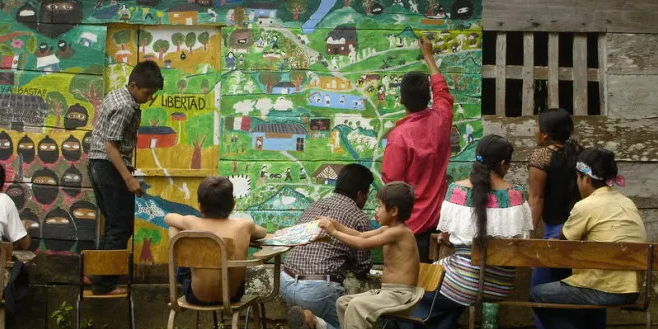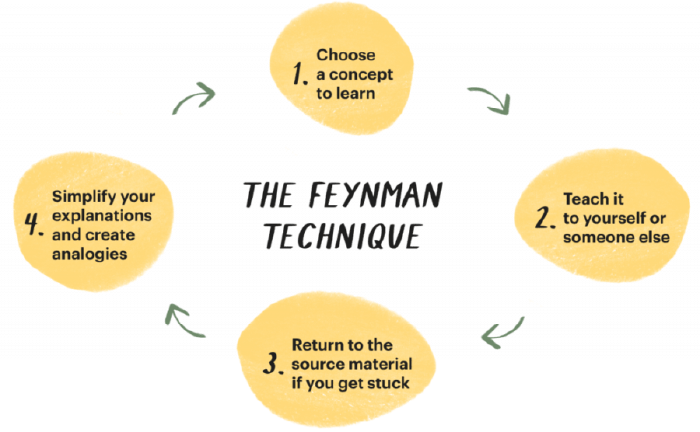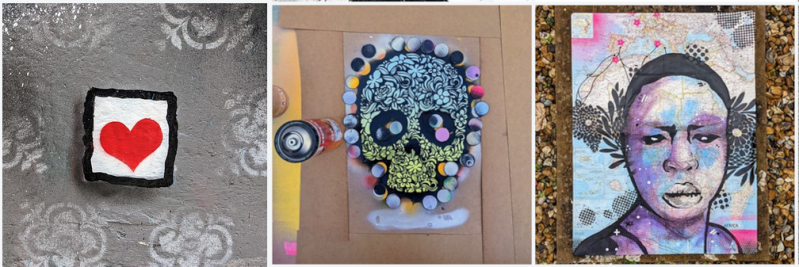Mentoring

In DisCOSpeak, when we refer to Mentoring we are describing a pedagogical process among peers. This is the way people learn how to DisCO: by doing with others[1].
Description
Taking its cue from the Zapatista practice of learning by listening, Mentoring doesn't assume that more experienced DisCONauts have more or better knowledge than new members. Instead they have more specific knowledge and experience about DisCOs in general (as well as the mentor's own DisCO in particular) to share.
The ultimate goal mentoring is to learn and grow together by including the mentee's observations and feedback. This method of peer learning serves to make each DisCO's culture more varied and robust, as well as truly inclusive of new members' ideas and reflections.
Coming and co-learning together the DisCO Way
Mentoring is not limited to DisCO Dating, but a continual, iterative process. Much like the concept of Perpetual Beta often used software development, each DisCO's culture is expected to morph and adapt to its members needs as well as those of their environments and social climates. Mentoring is how this emergent process becomes concrete and creates new patterns.
The DisCO approach to mentoring has, among many others, very much been influenced by our colleagues at Zemos98. Their approach to learning is based on the four following tenets:
- trusting peer to peer knowledge,
- accepting diversity as an intellectual basis for our work together,
- connecting practices and experiences for the common good, and
- using not just oral but also visual languages.
In DisCO we follow suit. Wikis such as this are only a first step in what we consider to be a non-directive mutual space for learning. Texts can become meaningless without real human support to bring the ideas described here to life and in situated contexts. Videos, infographics and other media will help us learn and refine the message, but the most important work acquires meaning through our relationships.
If knowledge is power, then we want to share that power we've accumulated with new members so they feel a similar sense of ownership and familiarity as soon as it's feasible. We consider the learning to be mutual, bidirectional and based on personal relations and needs. When we speak about creating a knowledge commons in DisCO, we're not just talking about the articles and materials we publish on our website, but also the culture, practices and structures of the collective itself. As part of the community we first want you:
a) understand where we're coming from and why we've made these choices
b) add your voice to the choir and enrich our commons
Practically speaking, those with more experience in DisCO, such as members from the Guerrilla Media Collective DisCO Lab, mentor new members in the productive activities of the collective. Beyond this, all members mentor each other in cooperative culture, specifically the tools and practices of the DisCO in question.
The Feynman Technique
We are making a special note here to explain the importance of being fully familiar with the host DisCO.NP's Governance Model and Methods and how this is tied to the Feynman Technique.
Named after Nobel prize physicists and all around character Richard Feynman the technique consists of four simple steps:

- Choose a concept to learn. Select a topic you’re interested in learning about and write it at the top of a blank page in a notebook.
- Teach it to yourself or someone else. Write everything you know about a topic out as if you were explaining it to yourself. Alternately, actually teach it to someone else.
- Return to the source material if you get stuck. Go back to whatever you’re learning from – a book, lecture notes, podcast – and fill the gaps in your knowledge.
- Simplify your explanations and create analogies. Streamline your notes and explanation, further clarifying the topic until it seems obvious. Additionally, think of analogies that feel intuitive.
With this in mind, by Stage Three Daters are expected to be able to present the governance model publicly, and/or teach it to DisCOlars, new Daters or anyone interested.
For those anxious about public speaking it can be a simple as presenting it to other DisCONauts or trusted persons. They key takeaway is that complex systems are always best understood when, first, internally conceptualized and, then, made legible to others.
Failure to understand or being able to explain the model breaks the delicate balance between self and mutual coordination that's is at the heart of each DisCO and will likely result in serious Carework Imbalances.
In plain English: Not internalizing the model means that someone else has to clean up after you, whether they've chosen to or not. Barring learning disabilities and justifiable time and life constrains, knowing, caring for and co-creating your DisCO's Governance model, together with other DisCONauts is the (codified, evolving) soul of each DisCO.
We understand that DisCO Governance can seem complex or overwhelming at first. With good mentoring experience and inclusive resources has shown us that it's not. Like most worthwhile things it takes time, attention and care, both from Daters and Mentors alike.[2]
How Mentoring Helps: all around
Mentoring is always bi-directional (both ways), peer to peer, and available to any committed member. The outputs of the mentoring process are recorded as part of any DisCO's knowledge commons and openly shared through resources such as wikis or handbooks. While mentoring is an ongoing process, special attention is paid to those members going through the Dating Phase.
During the Dating Phase, mentoring is handled by your DisCO Buddy. DisCO Buddies take dating members through all aspects of working on the collective, its governance model and tools, etc. They ensure that new members get all they need to meet a series of criteria on the way to becoming full, committed DisCONAUTS. After the Dating Phase is over you will no longer have an exclusively DisCO Buddy assigned, instead you will become a new Dating Member's Buddy.
Full members will still receive assistance, of course, but it's now seen as a collective responsibility, rather than an individual one. Anyone needing mentoring support after the Dating Phase is encouraged to signal this through Mattermost and Loomio to reach out for guidance.
We don't expect everyone to know everything all the time, but DisCONAUTS are expected to be able to mentor new members and each other in several areas and new members are expected to be open and available for this process.
Examples
(Text goes here)
Why this is important
(Text goes here)
Tensions
(Text goes here)
Interactions with other Elements
(Text goes here)
Related Elements
(Text goes here)
Further reading
- Bulleted list item
TLDR
- Bulleted list item
Image Credits
- Lead Image sourced from INSTITUTE_of_RADICAL_IMAGINATION
- ↑ Also known as DIWO
- ↑ The DisCO Mothership is dedicated to creating diverse learning resources for all publics. These outputs are contingent on our group's human capabilities and funding. You can support us in a number of ways, as explained here: Support DisCO
